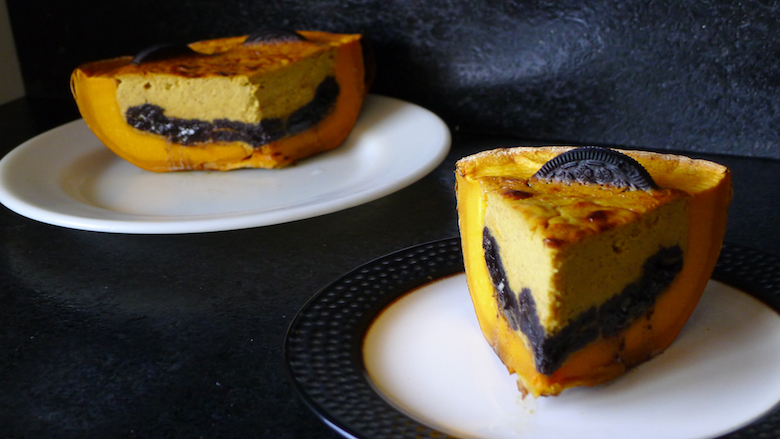Download: word.doc here | Image file here | Return to Editor’s Lounge

I love pumpkin pie, but I hate making crust. And I will gladly spend more time not making a crust than I would have spent making it. I’ll make pumpkin souffle, pumpkin pudding cups, or some other crust-free pumpkin-based alternative.
This quirky aversion has led me to some delicious, non-crusty places I can’t wait to show you. But first, a reminder that pumpkin is just one type of winter squash, of which there are many types that make great pie. When I say “pumpkin” I mean pie squash. In fact, the “pumpkin” in most cans of pumpkin pie filling is actually a butternut squash variety called Dickinson.
As for that crust we are most definitely not going to make, it turns out that history is on our side. At the alleged first Thanksgiving feast, nobody — immigrant or local alike — had access to flour, butter or an oven.
But while our nation’s inaugural harvest party was a crust-free affair, squash were a staple for the Wampanoag tribe that mixed with the Pilgrims, and an important part of surviving winter. At that first supper of our nation, some historians speculate that a proto-pie, baked in an earthen pit, may have consisted of a hollowed-out pumpkin filled with a honey-sweetened egg custard.
I know from experience, however, that if you fill a whole pumpkin with custard and bake it, by the time all of that custard cooks and expands, the container will have become too soft to hold the filling. But half a squash, filled with custard and baked like a pie, cooks together in harmony with the filling.
It’s a beautiful, decadent combination. The baked flesh has its own custard-like texture, pulls cleanly from the hard skin, and is easy to eat with the extra-rich filling.
But a friend, trying to be helpful, burst my bubble with a pragmatic question. “Does a soft pumpkin border truly impart the same satisfaction as a flaky, buttery crust?”
Well, he had a point, which I addressed in a way that allowed me to retain my dignity and values. I’m not usually an Oreo guy, but I’m so much less of a crust guy I made an exception, because I had this crazy idea that I was pretty sure would work. I bought some Oreos, and use them to line the inside of a half-pumpkin. Then I added custard mix, and baked it.
The improvement was immediately obvious. The Oreos formed a pleasing, cakey layer between custard and squash, and their dark chocolate flavor formed a lovely complement to the pumpkin and custard. Because Oreos are so sweet, I skipped the sugar in the pie filling, and that deconstruction worked perfectly.
Eager to explore the possibilities, I then tiled the inside of a pie pan with yet more Oreos, patching the gaps between the discs with crumbled pieces, and filled it with pumpkin pie filling. When baked, the Oreos made it easy to cut and serve the filling, and I was happy to have it. And you are welcome to try it. Just don’t call it a crust.
Pumpkin Pie, with choice of non-crust
Here is a recipe for a sturdy, custardy pumpkin pie filling that will work with whichever choose-your-own-crust-adventure you go with.
4 eggs
1 cup heavy cream
1 ½ cups milk
¼ tsp salt
2 teaspoon vanilla
2 teaspoon pumpkin pie spices
⅓ cup sugar (If baking in a pumpkin, use less sugar. If using Oreos, omit the sugar)
2 cups pumpkin flesh
Combine all ingredients in a blender. Blend for about 30 seconds, until completely homogenized.
Pour into the crust of your choice and bake for 45-60 minutes at 400 degrees, until it puffs up and starts to crack and brown on top. Remove from the heat and allow to cool and settle. Serve at room temperature.
Pumpkin Flesh Crust
1 pie pumpkin or other suitable squash
¼ teaspoon pumpkin pie spices
Cut a pumpkin around the equator into two equal sized bowls. With a strong spoon, scrape out all of the loose, stringy flesh and seeds from both halves, so the meat is clean and ready to eat. (Save the seeds and bake them, with salt and a little oil, along with the pies.) Use a vegetable peeler to trim and tidy the rim. The bottom half of a pie pumpkin sits comfortably on a flat surface, and makes a better pie holder than the upper part. So I prefer to bake the upper part unfilled, for use in the next batch of pumpkin pie filling.
Sprinkle the bottom half with pie spices, pour in the custard up to the rim, and place in a baking dish or on a cookie sheet. Bake for about an hour at 400, keeping an eye on the custard. It will swell and probably start to crack. When the top starts to brown, and the custard moves more like a solid than a liquid, remove from the oven and cool.
Oreo Crust
Oreos (or store brand sandwich cookies)
Place the Oreos along the inside a pie pan or pumpkin. First line the bottom, then the side of the baking pan or pumpkin with more Oreos. If you wish, fill in the gaps between Oreos with crumbled Oreos. Make sure some edges protrude above the rim.
Fill with custard and bake as above.